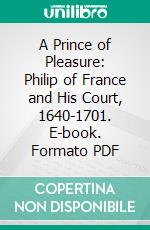H Stokes eBooks
eBooks di H Stokes
Francisco Goya: A Study of the Work and Personality, of the Eighteenth Century Spanish, Painter and Satirist. E-book. Formato PDF Hugh Stokes - Forgotten Books, 2017 -
Valerian von Loga's careful biography neglects to exhibit its subject in a proper frame. It is impossible to appreciate Goya, or to judge his actions, if we are ignorant of the age in which he lived._ English readers know little of Spain during the eighteenth century. The names of Philip II. Or Philip IV. Come pat to our lips when we talk about Velazquez and his forerunners, and it is comparatively easy to form some opinion upon the Spanish decadence of the seventeenth century. But the reigns of Philip V Ferdinand VI Charles III Charles IV., and Ferdinand VII., carry few associations. The social history of their Courts is an undiscovered continent. Yet, if we wish to understand Goya's position, we must learn something of the existence around him. We must at least attempt to breathe the atmosphere of Madrid during those days of transition, and to follow the tangled political situation which resulted in the Peninsula War. How can Hogarth's art be enjoyed if we refuse to glance at the London of the early Georgians French art of the eighteenth century cannot be disassociated from the history of Louis XV. Art, even more than literature, is the mirror of the life from which it springs.
A Prince of Pleasure: Philip of France and His Court, 1640-1701. E-book. Formato PDF Hugh Stokes - Forgotten Books, 2017 -
The Bibliography cites the chief documents upon which this volume has been based. Some modern critics hardly value the memoirs of the seventeenth century at their real worth. They are indeed collections of gossip, often requiring considerable patience to search for the illuminating facts scattered throughout their pages. But social history is founded upon personal gossip. Pepys was a gossip, so was Horace Walpole, and, later, Creevey. Madame de Sevigne was an enchanting museum, whose letters would be even more fascinating if she had not been oppressed by the fear that her correspondence was liable to examination in the post. It cannot be said that French memoirs sparkle in every line. Although the bore is not encouraged on the other side of the Channel, it is impossible to restrain him altogether from writing to his relations or dictating his reminiscences. But even the bore, however wearisome, has interesting material at his command. French writers of this description have generally something to say, and, if their budget runs thin, they draw on that keen wit and happy philosophy which is a national rather than a personal gift. When they tell a story they endeavour to recapture the actual conversation. It is curious to compare an incident as related respectively by Mademoiselle de Mont pensier and Ralph Montagu. The Englishman gives the bald facts the Frenchwoman artistically creates a dramatic picture.

